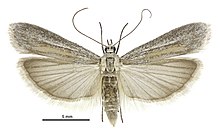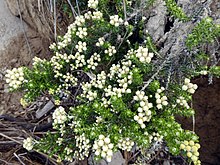| Homoeosoma anaspila | |
|---|---|

| |
| Female | |
| Scientific classification | |
| Kingdom: | Animalia |
| Phylum: | Arthropoda |
| Class: | Insecta |
| Order: | Lepidoptera |
| Family: | Pyralidae |
| Genus: | Homoeosoma |
| Species: | H. anaspila |
| Binomial name | |
| Homoeosoma anaspila Meyrick, 1901 | |
Homoeosoma anaspila is a species of snout moth in the genus Homoeosoma. It is endemic to New Zealand. It found in the North and South Islands as well as the Kermadec Islands.
Taxonomy
This species was first described by Edward Meyrick in 1901 using specimens from Waipukurau collected by Meryrick himself in March and two other specimens collected in Christchurch including one collected by R. W. Fereday. That latter specimen is the designated lectotype and is held at the Natural History Museum, London.
Description
Meyrick described the species as follows:
♀ 16-21 mm. Head, palpi, and thorax fuscous, irrorated with white. Forewings very narrow, posteriorly somewhat dilated ; 4 and 5 stalked ; white, more or less inorated with fuscous ; first line cloudy, fuscous, angulated in middle, but usually quite obsolete : cilia pale fuscous, irrorated with white. Hindwings whitish-fuscous, termen slenderly dark fuscous ; cilia whitish, with a faint fuscous subbasal line.
Distribution
The species is endemic to New Zealand. It has been collected in the wider Mackenzie basin, and the Canterbury region, as well as on the Kermadec Islands.
Biology and behaviour
The adults of this moth are on the wing during the months of October to December and also in March.
Habitat and host species

The larvae feed on Vittandinia species including Vittadinia gracilis and Vittadinia australis as well as Helichrysum luteoalbum, Hieracium lepidulum, Jacobaea vulgaris and Ozothamnus leptophyllus.
References
- ^ "Homoeosoma anaspila Meyrick, 1901". www.nzor.org.nz. Manaaki Whenua Landcare Research. Retrieved 2019-05-27.
- ^ Meyrick, Edward (1901). "XVII. Descriptions of New Lepidoptera from New Zealand". Transactions of the Royal Entomological Society of London. 49 (4): 565–580. doi:10.1111/J.1365-2311.1901.TB01373.X – via Biodiversity Heritage Library.
- Dugdale, John S. (1988). "Lepidoptera - annotated catalogue, and keys to family-group taxa". Fauna of New Zealand. 14: 1–264.
- Gordon, Dennis P., ed. (2010). New Zealand inventory of biodiversity. Volume two. Kingdom animalia : chaetognatha, ecdysozoa, ichnofossils. Vol. 2. Christchurch, N.Z.: Canterbury University Press. p. 463. ISBN 9781877257933. OCLC 973607714.
- ^ Patrick, B. H. (1992). "Supplement to the Lepidoptera of the Mackenzie Country with recommendations on their conservation". New Zealand Entomologist. 15 (1): 48–58. CiteSeerX 10.1.1.534.4540. doi:10.1080/00779962.1992.9722629. ISSN 0077-9962.
- Dugdale, J. S. (1973). "A note on Kermadec Islands lepidoptera". New Zealand Entomologist. 5 (2): 197–203. doi:10.1080/00779962.1973.9723001. ISSN 0077-9962.
- ^ Patrick, Brian (1994). "Lepidoptera of Kaitorete Spit, Canterbury". New Zealand Entomologist. 17 (1): 52–63. CiteSeerX 10.1.1.580.6402. doi:10.1080/00779962.1994.9721985. ISSN 0077-9962.
- "Invertebrate herbivore biodiversity report". plant-synz.landcareresearch.co.nz. Manaaki Whenua Landcare Research. Retrieved 2019-05-27.
| Taxon identifiers | |
|---|---|
| Homoeosoma anaspila | |